Psychology Essay: Exploring the Dynamics of Pro-social Behavior
VerifiedAdded on 2023/01/11
|5
|1057
|49
Essay
AI Summary
This psychology essay delves into the multifaceted concept of pro-social behavior, examining its psychological underpinnings and influencing factors. It explores empathy as a fundamental element, highlighting how it drives individuals to understand and assist others. The essay discusses altruism, the inherent goodness of human beings, and the evolutionary perspectives on pro-social actions, including kin selection and reciprocal altruism. It also analyzes the impact of gender, culture, and emotions like guilt and mood on pro-social behavior. Furthermore, the essay references key studies to illustrate the interplay of cognitive and emotional parameters, ultimately aiming to provide a comprehensive understanding of why humans help each other.
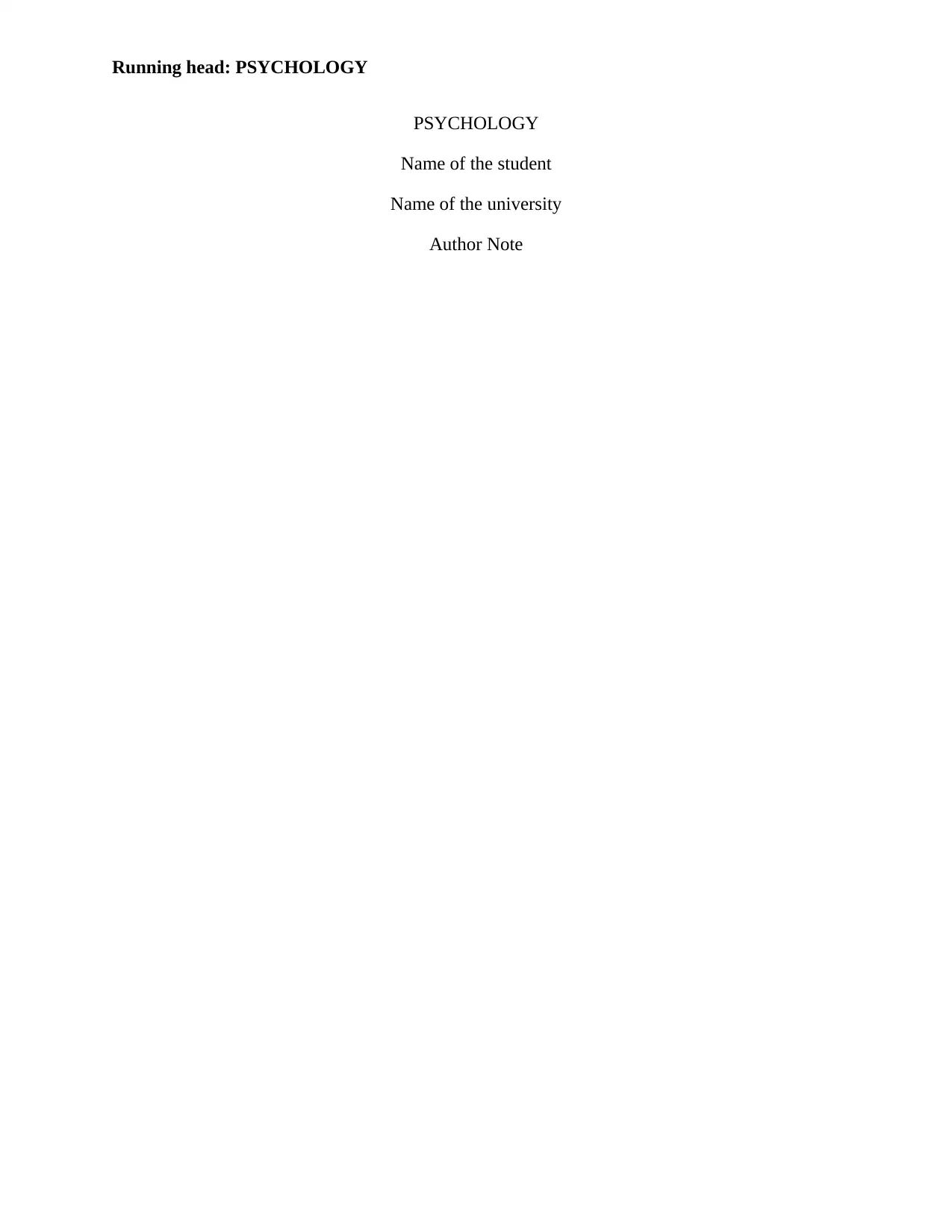
Running head: PSYCHOLOGY
PSYCHOLOGY
Name of the student
Name of the university
Author Note
PSYCHOLOGY
Name of the student
Name of the university
Author Note
Paraphrase This Document
Need a fresh take? Get an instant paraphrase of this document with our AI Paraphraser
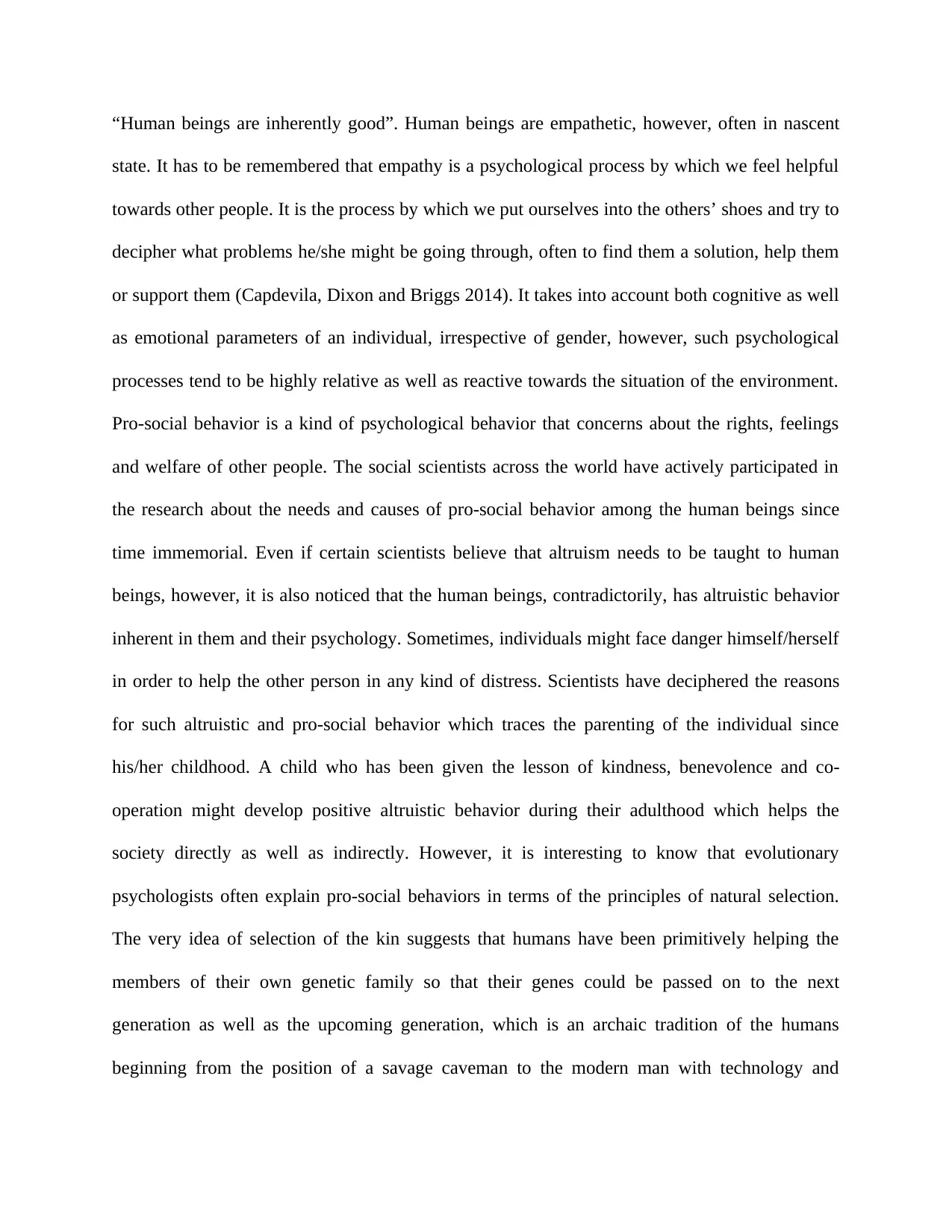
“Human beings are inherently good”. Human beings are empathetic, however, often in nascent
state. It has to be remembered that empathy is a psychological process by which we feel helpful
towards other people. It is the process by which we put ourselves into the others’ shoes and try to
decipher what problems he/she might be going through, often to find them a solution, help them
or support them (Capdevila, Dixon and Briggs 2014). It takes into account both cognitive as well
as emotional parameters of an individual, irrespective of gender, however, such psychological
processes tend to be highly relative as well as reactive towards the situation of the environment.
Pro-social behavior is a kind of psychological behavior that concerns about the rights, feelings
and welfare of other people. The social scientists across the world have actively participated in
the research about the needs and causes of pro-social behavior among the human beings since
time immemorial. Even if certain scientists believe that altruism needs to be taught to human
beings, however, it is also noticed that the human beings, contradictorily, has altruistic behavior
inherent in them and their psychology. Sometimes, individuals might face danger himself/herself
in order to help the other person in any kind of distress. Scientists have deciphered the reasons
for such altruistic and pro-social behavior which traces the parenting of the individual since
his/her childhood. A child who has been given the lesson of kindness, benevolence and co-
operation might develop positive altruistic behavior during their adulthood which helps the
society directly as well as indirectly. However, it is interesting to know that evolutionary
psychologists often explain pro-social behaviors in terms of the principles of natural selection.
The very idea of selection of the kin suggests that humans have been primitively helping the
members of their own genetic family so that their genes could be passed on to the next
generation as well as the upcoming generation, which is an archaic tradition of the humans
beginning from the position of a savage caveman to the modern man with technology and
state. It has to be remembered that empathy is a psychological process by which we feel helpful
towards other people. It is the process by which we put ourselves into the others’ shoes and try to
decipher what problems he/she might be going through, often to find them a solution, help them
or support them (Capdevila, Dixon and Briggs 2014). It takes into account both cognitive as well
as emotional parameters of an individual, irrespective of gender, however, such psychological
processes tend to be highly relative as well as reactive towards the situation of the environment.
Pro-social behavior is a kind of psychological behavior that concerns about the rights, feelings
and welfare of other people. The social scientists across the world have actively participated in
the research about the needs and causes of pro-social behavior among the human beings since
time immemorial. Even if certain scientists believe that altruism needs to be taught to human
beings, however, it is also noticed that the human beings, contradictorily, has altruistic behavior
inherent in them and their psychology. Sometimes, individuals might face danger himself/herself
in order to help the other person in any kind of distress. Scientists have deciphered the reasons
for such altruistic and pro-social behavior which traces the parenting of the individual since
his/her childhood. A child who has been given the lesson of kindness, benevolence and co-
operation might develop positive altruistic behavior during their adulthood which helps the
society directly as well as indirectly. However, it is interesting to know that evolutionary
psychologists often explain pro-social behaviors in terms of the principles of natural selection.
The very idea of selection of the kin suggests that humans have been primitively helping the
members of their own genetic family so that their genes could be passed on to the next
generation as well as the upcoming generation, which is an archaic tradition of the humans
beginning from the position of a savage caveman to the modern man with technology and
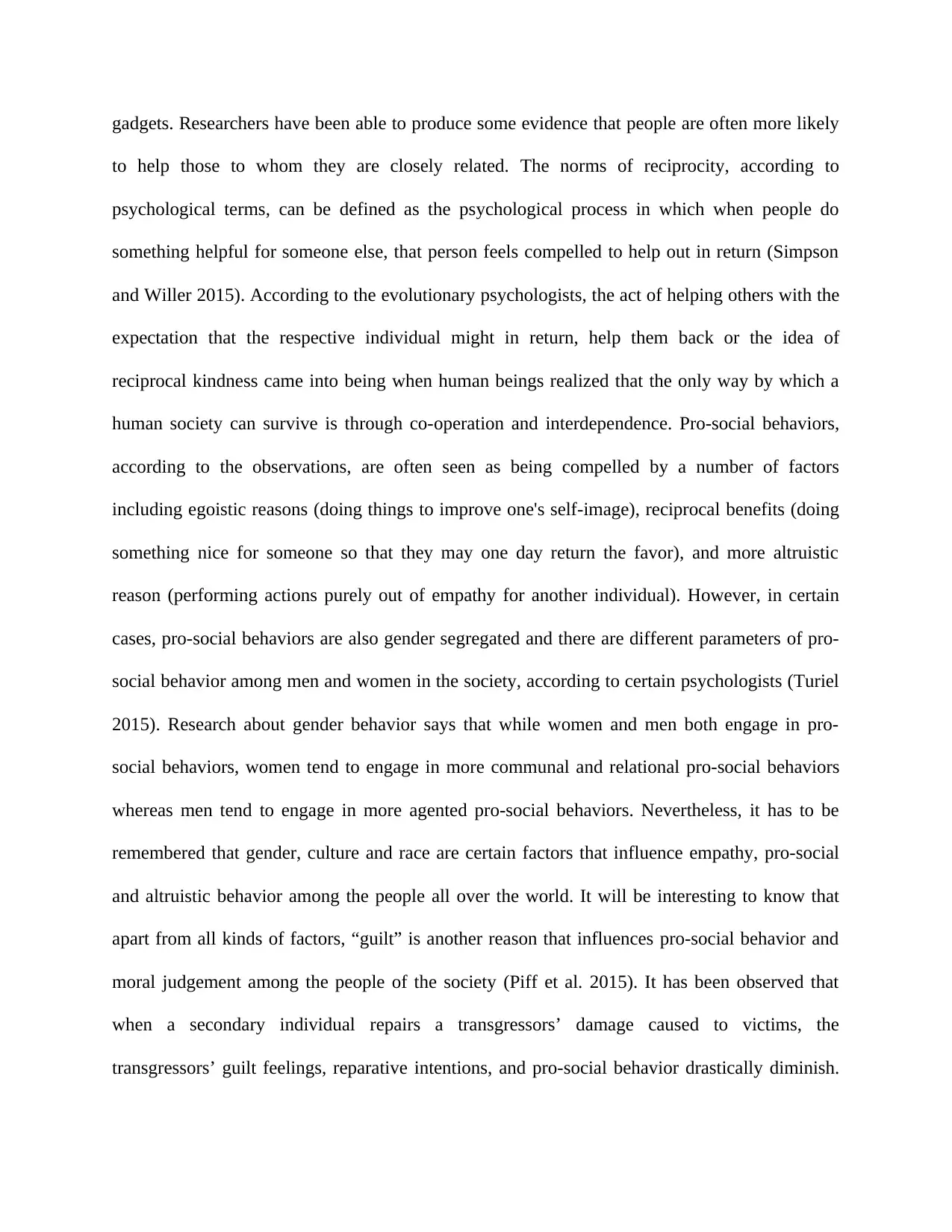
gadgets. Researchers have been able to produce some evidence that people are often more likely
to help those to whom they are closely related. The norms of reciprocity, according to
psychological terms, can be defined as the psychological process in which when people do
something helpful for someone else, that person feels compelled to help out in return (Simpson
and Willer 2015). According to the evolutionary psychologists, the act of helping others with the
expectation that the respective individual might in return, help them back or the idea of
reciprocal kindness came into being when human beings realized that the only way by which a
human society can survive is through co-operation and interdependence. Pro-social behaviors,
according to the observations, are often seen as being compelled by a number of factors
including egoistic reasons (doing things to improve one's self-image), reciprocal benefits (doing
something nice for someone so that they may one day return the favor), and more altruistic
reason (performing actions purely out of empathy for another individual). However, in certain
cases, pro-social behaviors are also gender segregated and there are different parameters of pro-
social behavior among men and women in the society, according to certain psychologists (Turiel
2015). Research about gender behavior says that while women and men both engage in pro-
social behaviors, women tend to engage in more communal and relational pro-social behaviors
whereas men tend to engage in more agented pro-social behaviors. Nevertheless, it has to be
remembered that gender, culture and race are certain factors that influence empathy, pro-social
and altruistic behavior among the people all over the world. It will be interesting to know that
apart from all kinds of factors, “guilt” is another reason that influences pro-social behavior and
moral judgement among the people of the society (Piff et al. 2015). It has been observed that
when a secondary individual repairs a transgressors’ damage caused to victims, the
transgressors’ guilt feelings, reparative intentions, and pro-social behavior drastically diminish.
to help those to whom they are closely related. The norms of reciprocity, according to
psychological terms, can be defined as the psychological process in which when people do
something helpful for someone else, that person feels compelled to help out in return (Simpson
and Willer 2015). According to the evolutionary psychologists, the act of helping others with the
expectation that the respective individual might in return, help them back or the idea of
reciprocal kindness came into being when human beings realized that the only way by which a
human society can survive is through co-operation and interdependence. Pro-social behaviors,
according to the observations, are often seen as being compelled by a number of factors
including egoistic reasons (doing things to improve one's self-image), reciprocal benefits (doing
something nice for someone so that they may one day return the favor), and more altruistic
reason (performing actions purely out of empathy for another individual). However, in certain
cases, pro-social behaviors are also gender segregated and there are different parameters of pro-
social behavior among men and women in the society, according to certain psychologists (Turiel
2015). Research about gender behavior says that while women and men both engage in pro-
social behaviors, women tend to engage in more communal and relational pro-social behaviors
whereas men tend to engage in more agented pro-social behaviors. Nevertheless, it has to be
remembered that gender, culture and race are certain factors that influence empathy, pro-social
and altruistic behavior among the people all over the world. It will be interesting to know that
apart from all kinds of factors, “guilt” is another reason that influences pro-social behavior and
moral judgement among the people of the society (Piff et al. 2015). It has been observed that
when a secondary individual repairs a transgressors’ damage caused to victims, the
transgressors’ guilt feelings, reparative intentions, and pro-social behavior drastically diminish.
⊘ This is a preview!⊘
Do you want full access?
Subscribe today to unlock all pages.

Trusted by 1+ million students worldwide
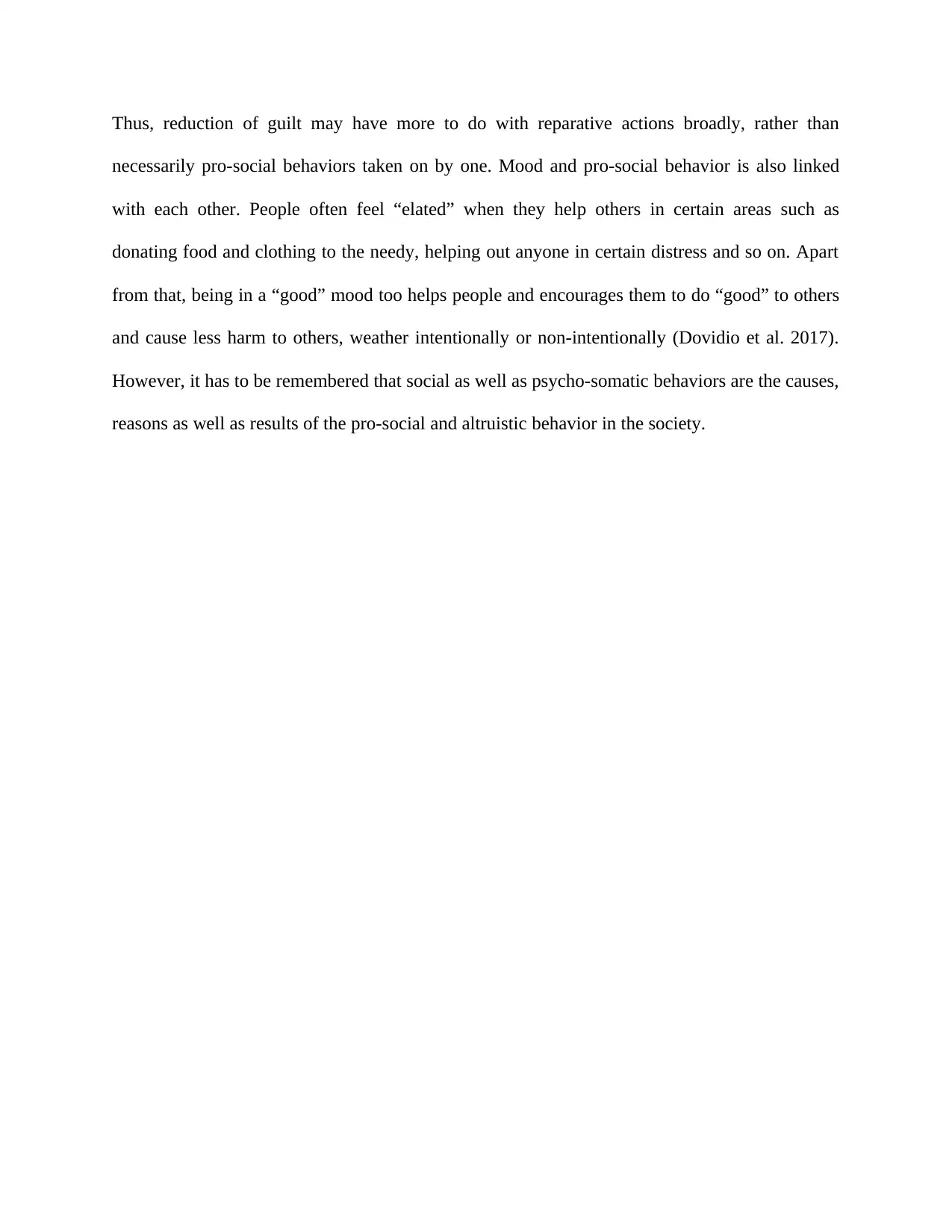
Thus, reduction of guilt may have more to do with reparative actions broadly, rather than
necessarily pro-social behaviors taken on by one. Mood and pro-social behavior is also linked
with each other. People often feel “elated” when they help others in certain areas such as
donating food and clothing to the needy, helping out anyone in certain distress and so on. Apart
from that, being in a “good” mood too helps people and encourages them to do “good” to others
and cause less harm to others, weather intentionally or non-intentionally (Dovidio et al. 2017).
However, it has to be remembered that social as well as psycho-somatic behaviors are the causes,
reasons as well as results of the pro-social and altruistic behavior in the society.
necessarily pro-social behaviors taken on by one. Mood and pro-social behavior is also linked
with each other. People often feel “elated” when they help others in certain areas such as
donating food and clothing to the needy, helping out anyone in certain distress and so on. Apart
from that, being in a “good” mood too helps people and encourages them to do “good” to others
and cause less harm to others, weather intentionally or non-intentionally (Dovidio et al. 2017).
However, it has to be remembered that social as well as psycho-somatic behaviors are the causes,
reasons as well as results of the pro-social and altruistic behavior in the society.
Paraphrase This Document
Need a fresh take? Get an instant paraphrase of this document with our AI Paraphraser
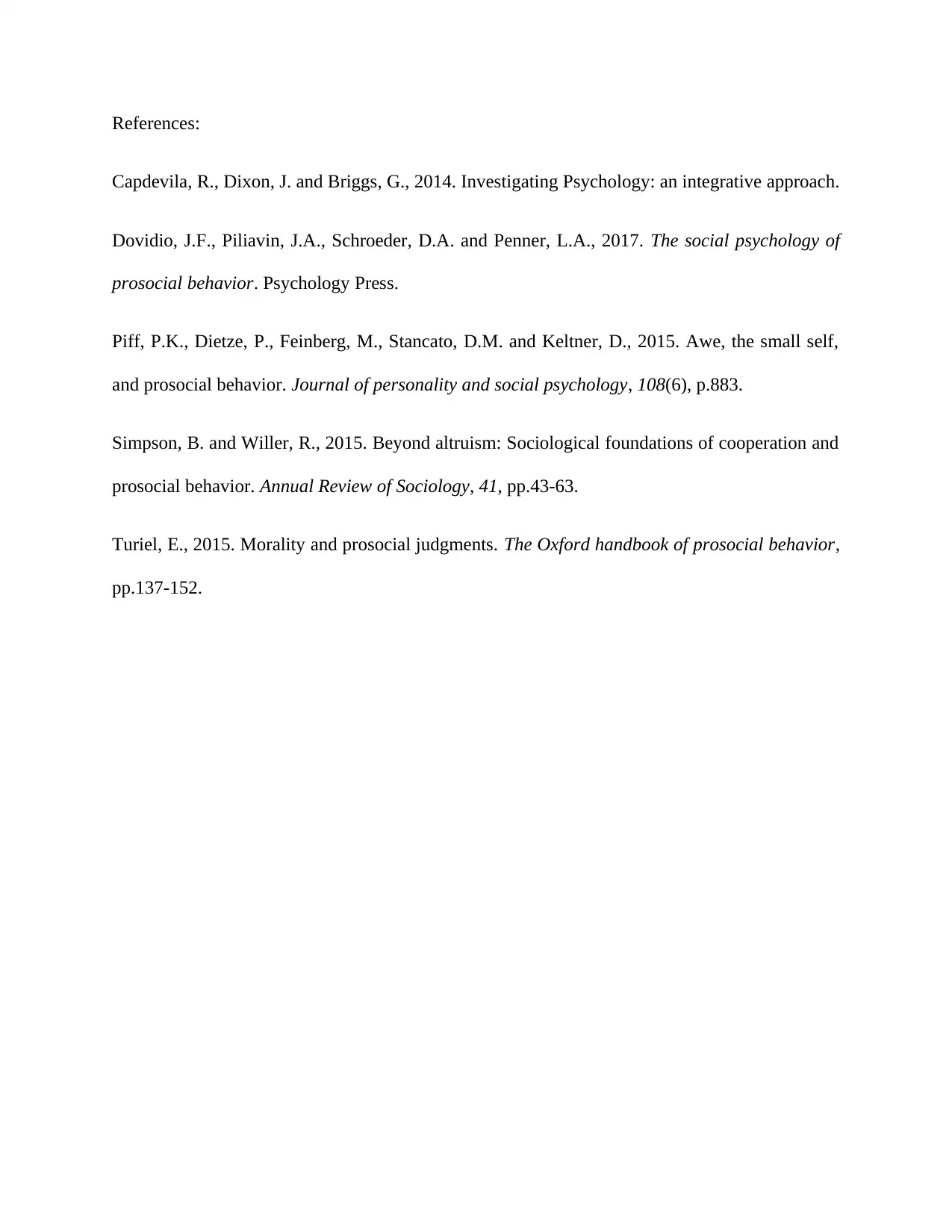
References:
Capdevila, R., Dixon, J. and Briggs, G., 2014. Investigating Psychology: an integrative approach.
Dovidio, J.F., Piliavin, J.A., Schroeder, D.A. and Penner, L.A., 2017. The social psychology of
prosocial behavior. Psychology Press.
Piff, P.K., Dietze, P., Feinberg, M., Stancato, D.M. and Keltner, D., 2015. Awe, the small self,
and prosocial behavior. Journal of personality and social psychology, 108(6), p.883.
Simpson, B. and Willer, R., 2015. Beyond altruism: Sociological foundations of cooperation and
prosocial behavior. Annual Review of Sociology, 41, pp.43-63.
Turiel, E., 2015. Morality and prosocial judgments. The Oxford handbook of prosocial behavior,
pp.137-152.
Capdevila, R., Dixon, J. and Briggs, G., 2014. Investigating Psychology: an integrative approach.
Dovidio, J.F., Piliavin, J.A., Schroeder, D.A. and Penner, L.A., 2017. The social psychology of
prosocial behavior. Psychology Press.
Piff, P.K., Dietze, P., Feinberg, M., Stancato, D.M. and Keltner, D., 2015. Awe, the small self,
and prosocial behavior. Journal of personality and social psychology, 108(6), p.883.
Simpson, B. and Willer, R., 2015. Beyond altruism: Sociological foundations of cooperation and
prosocial behavior. Annual Review of Sociology, 41, pp.43-63.
Turiel, E., 2015. Morality and prosocial judgments. The Oxford handbook of prosocial behavior,
pp.137-152.
1 out of 5
Related Documents
Your All-in-One AI-Powered Toolkit for Academic Success.
+13062052269
info@desklib.com
Available 24*7 on WhatsApp / Email
![[object Object]](/_next/static/media/star-bottom.7253800d.svg)
Unlock your academic potential
Copyright © 2020–2026 A2Z Services. All Rights Reserved. Developed and managed by ZUCOL.





